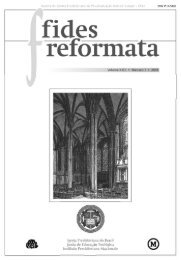Fides 22 N2
Um publicação do Centro Presbiteriano de Pós-graduação Andrew Jumper.
Um publicação do Centro Presbiteriano de Pós-graduação Andrew Jumper.
You also want an ePaper? Increase the reach of your titles
YUMPU automatically turns print PDFs into web optimized ePapers that Google loves.
FIDES REFORMATA XXII, Nº 2 (2017): 139-162<br />
2.3.1 Herbert Kane’s Arguments<br />
The late J. Herbert Kane wrote: “One would naturally expect that the<br />
spiritual forces released by the Reformation would have prompted the Protestant<br />
churches of Europe to take the gospel to the ends of the earth. But such<br />
was not the case.” 67 Other theses stated or supported by Kane throughout his<br />
writings, including his revised and enlarged edition of Glover’s The Progress<br />
of World-Wide Missions, confirm his criticisms of the reformers. Glover’s<br />
work states, “Mighty as were the changes wrought, and far-reaching as were<br />
the influences exerted by the Reformation, it is to be borne in mind that that<br />
movement was not missionary in its character,” 68 and “Indeed, there is all too<br />
abundant evidence that most of the leaders of the Reformation, including Luther,<br />
Melanchthon, Calvin, Zwingli, and Knox, seem to have had no serious sense of<br />
responsibility for direct missionary efforts in behalf of heathen or Muslim.” 69<br />
Glover summarizes his position at the end of a short, five-page 70 chapter, “Period<br />
of the Reformation from Luther to the Halle Missionaries (1517-1650)”<br />
with these words: “Of missionary efforts on the part of the Reformation Church<br />
there is sadly little to record.” 71<br />
These are serious accusations that deserve some documentation by the<br />
mission historian who boldly and categorically comes to such conclusions.<br />
Although he does not mention Warneck’s name in his book, Glover seems to<br />
be parroting Warneck when he refers to the leaders of the Reformation. By<br />
mentioning the names of those leaders of the Reformation. Glover does not<br />
quote any of the reformers nor documents such bold statements. All five pages<br />
of his chapter on the Reformation period from 1517-1650 are supported only<br />
by four secondary sources: two works published in 1880 and 1894 and two<br />
published in 1901 and 1912.<br />
Kane seems to be in total agreement with Glover. The main arguments<br />
used by Kane to support such “findings” are the following. First, Kane attests<br />
that the reformers did not prompt “the Protestant churches in Europe to take<br />
the gospel to the ends of the earth” 72 because of their theology. He presents<br />
67 J. Herbert Kane, A Global View of Christian Missions: From Pentecost to the Present (Grand<br />
Rapids: Baker Book House, 1971 [1972]), 73. And A Concise History of the Christian Mission: A<br />
Panoramic View of Missions from Pentecost to the Present. Rev. ed. (Grand Rapids: Baker Book House,<br />
1978 [1982]), 73.<br />
68 Robert Hall Glover, The Progress of World-Wide Missions, revised and enlarged by J. Herbert<br />
Kane (New York: Harper & Row, Publishers, 1960) 40.<br />
69 Ibid., 40.<br />
70 Glover dedicates two pages of the five to “missionary” work of the Roman Catholic church<br />
through Francis Xavier (1506-1552), one page of which is a four-paragraph quote from Arthur T. Pierson’s<br />
appreciation for Xavier’s career as the “Romish Apostle to the Indies.”<br />
71 Ibid., 44.<br />
72 Kane, A Concise History, 73.<br />
155




